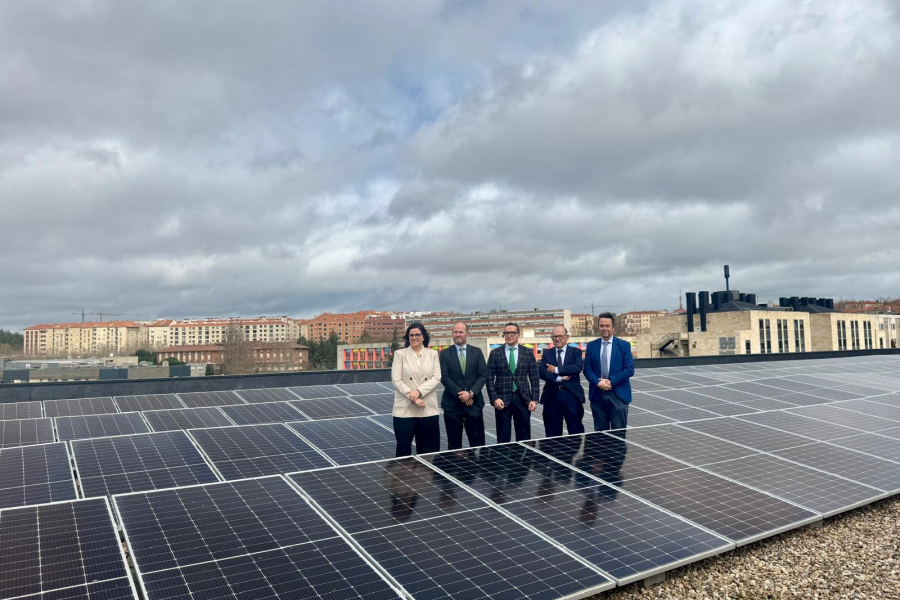Promoted by Iberdrola España, the University of Salamanca will save 250,000 euros a year on its electricity bill thanks to more than 3,800 photovoltaic panels
- This form of self-consumption, which generates 100% sustainable energy and Iberdrola España has installed on a total of 16 roofs, will prevent the release of more than 1,000 tonnes of CO2 per year and will cover up to 25% of the buildings' electricity needs
- With this pioneering initiative in Castilla and León, the university aims to make major progress in the coming years in reducing its carbon footprint as well as in boosting efficiency and competitiveness

Iberdrola España has connected the University of Salamanca (USAL) to solar energy. The academic institution and the electricity company are deepening their commitment to environmental conservation and to fight climate change with the installation of a system of self-consumption solar that is pioneering in Castilla and León on the roofs of 16 of its buildings at the Unamuno Campus in Salamanca and the Viriato Campus in Zamora.
The rector of the University of Salamanca, Juan Manuel Corchado, and the Iberdrola España representative in Castilla and León, Miguel Calvo, accompanied by the general director of Infrastructures and Environmental Sustainability of the Regional Government of Castilla and León, José Manuel Jiménez, Iberdrola's Large Customer Manager in Salamanca, Sara Merino, and the head of Sustainability and Energy Efficiency at the University of Salamanca, Pedro Calero, inaugurated this photovoltaic system installed by the company Enerpal this morning.
With this system the university will save €250 k a year on its electricity bill and around €6 M over the project’s lifespan.
This joint action has made it possible to install a total of 3,803 photovoltaic solar panels – totalling 2,073 kWp – with different solutions for each of the roofs, fully integrated into the buildings’ aesthetics. In addition, this form of self-consumption, which generates 100% sustainable energy, will prevent the release of more than 1,000 tonnes of CO2 a year.
The company's investment amounts to €1.7 M and with the 20-year system management agreement USAL will obtain power equivalent to 25% of the use of the buildings with the solar panels, at a price of less than €70/MWh, with an estimated production of up to 3,000 megawatt hours per year, equivalent to the average consumption of 500 homes or a population of 1,500.
Rector Juan Manuel Corchado stressed the importance of this pioneering project in Castilla and León, which is currently being rolled out on 16 buildings, and with which the University of Salamanca ‘reaffirms its commitment to the environment’.
‘'Climate change, biodiversity loss, pollution and scarcity of natural resources are not future threats, they are already here affecting our daily lives. Universities cannot simply stand by; they must take an active role as drivers of change, pushing the transition towards a more sustainable and responsible development model,’ said Corchado, who referred to this initiative as ‘an example of public-private collaboration on sustainability issues’.
For the rector, environmental sustainability ‘is not an option, it’s a necessity and also an opportunity’ and he considered that universities must play a leading role in that transformation. ‘Those who lead in these areas will be better positioned to continue advancing in the future. And universities, as centres of knowledge and social change, must lead this transformation. We need more research, more environmental education, more real action and real commitment from all actors in the university community,’ he stressed.
‘This project boosts the efficiency and competitiveness of the University of Salamanca and generates significant environmental benefits for our neighbours. It’s also in line with Iberdrola España's priorities and objectives to accelerate the energy transition and contribute to a more sustainable development model,’ said Miguel Calvo, Iberdrola España's representative in Castilla and León.
The latest-generation photovoltaic modules are equipped with sensorised and connected high-performance inverters so the fundamental parameters of the installations can be monitored online. The built-in smart solution provides real-time information on the energy consumed and produced via an app.
The faculties of Pharmacy, Medicine, Unamuno Pavilion, Nursing, Biology, Law and the Francisco de Vitoria Library, the FES building and the Cancer Research Centre are the buildings on the Unamuno Campus that have solar panels on their roofs. Also in Salamanca, the faculties of Education, Fine Arts, the Colegio Mayor San Bartolomé and two research institutes, INCYL and CIALE, were equipped with solar panels. In Zamora, the classroom buildings and the sports hall were outfitted with panels.
Leader in self-consumption
As part of its commitment to accelerating the energy transition, Iberdrola España not only promotes photovoltaic self-consumption by encouraging feeding it into the energy system through its grids but also leads the customer management market for this type of energy in Spain.
The group self-consumption solutions developed by Iberdrola España have made self-consumption available to any customer, whether they have their own roof or not. Customers in this segment also benefit from the Solar Plan, a competitive electricity tariff during the time when there is no sun, which is when they need to consume power from the grid, since during the day they supply themselves from their own installation.
Self-consumption solar systems can save 30% on annual bills in the case of apartment buildings, 50% for companies and businesses, and up to 70% in single-family homes. These savings are produced in three ways: the energy produced by the installation that the user does not have to buy, the compensation for the surplus energy not consumed that is fed into the grid and the savings due to lower taxes.
Iberdrola España's customers can use the Solar Cloud service, which allows them to offset surpluses over the energy term or gas price, even diverting that excess power for consumption at another residence.
